
- •Note to the Student from the Publisher
- •1 Nouns
- •2 Pronouns
- •3 Adjectives
- •4 Determiners
- •5 Verbs and Tenses
- •6 Auxiliary Verbs
- •7 Adverbs and Adverb Phrases
- •8 Prepositions and Prepositional Phrases
- •9 Conjunctions
- •10 Sentences
- •11 Direct and Indirect Speech
- •12 Punctuation
- •A List of Irregular Verbs

5 Verbs and Tenses
Most verbs describe actions, so they are called action verbs. Action verbs tell what people or things are doing. Here are some common action verbs.
drink |
look |
jump |
swim |
fall |
eat |
shout |
walk |
throw |
climb |
laugh |
run |
sit |
catch |
dance |
Subject and Verb Agreement
When you use a verb, you have to say who or what is doing the action. This ‘who or what’ is the subject of the verb. The subject and the verb match each other. You say that the subject and the verb agree when they match each other.
Use a singular verb if the subject is a singular noun. For example, the subjects ‘my dad’ or ‘our school’, or any of the pronouns he, she or it, require a singular verb. Most singular verbs end in s. Look at the subjects and their verbs in these examples. The subjects are in bold and the verbs are in color.
He always drinks milk when he’s hot.
She eats bananas for breakfast.
Mom walks to work every day.
My sister dances like a professional dancer.
The baby falls when she tries to walk.
Our cat climbs the trees in our garden.
This form of the verb is called the third person singular. You use it when the subject of the verb is not you or the person you are speaking to, but some other person—a third person—or a thing.
Here are some more third person singular verbs that end in s.
plays |
sings |
shines |
rides |
smiles |
draws |
paints |
blows |
thinks |
stops |
reads |
rains |
travels |
talks |
starts |
52

Verbs and Tenses: Subject and Verb Agreement
The third person singular form of some verbs is made by adding es at the end. Some examples are verbs that end in sh, ch, ss, x, zz and o.
brushes |
watches |
kisses |
fixes |
rushes |
reaches |
misses |
mixes |
polishes |
teaches |
passes |
buzzes |
crashes |
catches |
presses |
does |
washes |
touches |
dresses |
goes |
Here are some sentences with verbs in their third person singular form. The subjects are in bold and the verbs are in color.
She always brushes her teeth at bedtime.
Dad polishes his shoes until they shine.
My brother watches television after school.
Kim catches the ball with one hand.
Dad mixes flour and water when he makes bread.
The bee buzzes around the flowers.
My friend Sanjay goes to the same school as I do.
How do you make the third person singular form of most verbs that end in y? Usually, you just change the y to an i and then add es.
carry – carries cry – cries study – studies
hurry |
– |
hurries |
copy |
– |
copies |
fly |
– |
flies |
marry – |
marries |
|
worry – |
worries |
bully |
– |
bullies |
|
A cat carries its kitten with its mouth. Mr. Chen hurries to work every morning.
The baby cries a lot at night.
This plane flies to the island every day. Alice tries hard at school.
She copies all the questions in her notebook.
53

Verbs and Tenses: Subject and Verb Agreement
Some verbs that end in y have a vowel before the y. Just add an s at the end of these words to make the third person singular form.
buy |
– |
buys |
say |
– |
says |
pray – |
prays |
pay |
– |
pays |
annoy |
– |
annoys |
stay – |
stays |
Mom buys bread at the supermarket.
Mr. Carter pays all his bills with a credit card.
My friend says he has a salt-water aquarium.
She annoys me with her silly jokes.
Anna stays with her aunt on weekends.
If the subject of a verb is a plural noun, such as “Mom and Dad” or “our teachers”, use a plural verb. Do not add s, es or ies to plural verbs. Plural verbs are also used with the pronouns I, we, you and they.
Mom and Dad love us.
My sisters listen to music a lot.
The stars shine brightly on a clear night.
Some people drink tea.
I like juicy hamburgers.
We learn interesting things at school.
You all know the words to this song, children.
They always walk home from school together.
Suppose the subject of a noun refers to a group of people. Depending on the meaning of the sentence, you may use either a singular or a plural verb.
The audience was enjoying the play. The audience have all gone home.
The class has thirty students.
The class are handing in their papers.
The band is performing until midnight.
The band were arguing among themselves.
N o t e s
Words that refer to groups of people or animals are called collective nouns. Here are some more examples:
crowd |
committee |
herd |
crew |
litter |
flock |
54

Verbs and Tenses: Transitive and Intransitive Verbs
Transitive and Intransitive Verbs
Some verbs have an object. The object of a verb is the person or thing that is affected by the action of the verb. Look at this sentence:
Alice |
eats |
|
a banana for breakfast. |
||
▲ |
|
▲ |
|
▲ |
|
The subject |
|
The verb is the |
|
The object is affected |
|
does the action |
|
action word |
|
by the action |
|
|
|
|
|
|
|
The subject of the verb is Alice. She is the person who does the action: she eats. The object of the verb is a banana. A banana is affected by the action of the verb. So in this sentence, the object of the verb ‘eat ’ is ‘a banana’. Verbs that have objects are called transitive verbs.
Here are some sentences with transitive verbs. The verbs are printed in bold and their objects are printed in color.
John likes apples. |
Sam knows the answer to the question. |
My sister cooks all our meals. |
My brother rides his bike in the street. |
Dad buys tea at the market. |
Mom writes stories in her spare time. |
Some verbs don’t have an object. A verb that does not have an object is called an intransitive verb. Here are some sentences with intransitive verbs.
In China, lots of people walk to work.
The boys play in the yard after school.
Mr. Carter always drives very carefully.
Doris is a very successful businesswoman.
Michael and I both entered the race. He won but I lost.
Some verbs can be either transitive or intransitive. Notice that the transitive meaning and the intransitive meaning are sometimes different.
transitive verbs |
intransitive verbs |
|
|
The pilot flies the plane very well. |
Eagles fly high in the sky. |
The boys play football on weekends. |
The boys play in the yard on weekends. |
My mom runs her own company. |
My mom runs in the park for fun. |
We walk the dog every evening. |
We walk on the beach every evening. |
55

Exercise 1
Read the following sentences. Underline the verb in each sentence.
1.We live in an apartment on the boulevard.
2.Some children learn very fast.
3.We go for swimming lessons on Sunday.
4.I like my new bike.
5.Babies sometimes sleep during the day.
6.My dad buys a newspaper every morning.
7.These dolls belong to Kathleen.
8.I often walk to school with my dad.
9.My sister plays the piano very well.
10.Sarah sometimes reads in bed at night.
Exercise 2
Fill in the blank spaces with the third person singular form of the verbs in parentheses.
Example: Ali |
|
|
looks |
|
|
|
|
|
|
(look) sad today. |
||||||||||
1. |
Sumiko |
|
|
|
|
|
|
|
|
(speak) English very well. |
||||||||||
2. |
Mr. Kim |
|
|
|
|
|
|
|
|
|
(come) to school on his motorbike. |
|||||||||
3. |
My neighbor’s dog |
|
|
|
|
|
|
|
|
|
(bark) very loudly. |
|||||||||
4. |
My little brother always |
|
|
|
|
(brush) his teeth properly. |
||||||||||||||
5. |
Dad is so tall that his head almost |
|
|
|
(touch) the ceiling. |
|||||||||||||||
6. |
Our dog |
|
|
|
|
|
|
|
|
(catch) the ball in its teeth. |
||||||||||
7. |
Mom |
|
|
|
|
|
(mix) vinegar and oil to make salad dressing. |
|||||||||||||
8. |
Sally |
|
|
|
|
|
(try) not to disturb her brother when he’s reading. |
|||||||||||||
9. |
Dad |
|
|
|
(buy) his newspaper from the store on the corner. |
|||||||||||||||
10. |
Her music |
|
|
|
|
|
|
|
|
(annoy) me when I’m doing my homework. |
||||||||||
|
|
|
|
|
|
|
|
|||||||||||||
56

Exercise 3
Underline the verbs in the following sentences. Then show whether the verb is transitive or intransitive by putting a checkmark ( ) in the correct box. Remember that depending on the meaning, some verbs can be either transitive or intransitive. For each of the transitive verbs you have marked, write the object of the verb on the lines. The first one is done for you.
|
intransitive |
transitive |
object |
||||
|
|
verb |
|
verb |
|
||
|
|
|
|
|
|
|
chess |
1. |
My brother and I often play chess. |
|
|
|
|
|
|
|
|
|
|
|
|
|
|
|
|
|
|
|
|
||
2. |
Mom and Dad work in the garden on weekends. |
|
|
|
|
|
|
|
|
|
|
|
|
||
|
|
|
|
|
|
|
|
|
|
|
|
|
|
||
3. |
The library closes at 5 P.M. |
|
|
|
|
|
|
|
|
|
|
|
|
|
|
|
|
|
|
|
|
||
4. |
Mr. Ross drives his car very carefully. |
|
|
|
|
|
|
|
|
|
|
|
|
|
|
|
|
|
|
|
|
||
5. |
The cat jumped over the wall. |
|
|
|
|
|
|
|
|
|
|
|
|
|
|
|
|
|
|
|
|
||
6. |
My sister likes her new jeans. |
|
|
|
|
|
|
|
|
|
|
|
|
|
|
|
|
|
|
|
|
||
7. |
Grandad walks the dog every evening. |
|
|
|
|
|
|
|
|
|
|
|
|
|
|
|
|
|
|
|
|
||
8. |
Will you come with me to the shop? |
|
|
|
|
|
|
|
|
|
|
|
|
|
|
|
|
|
|
|
|
||
9. |
The boys are skating in the park. |
|
|
|
|
|
|
|
|
|
|
|
|
|
|
|
|
|
|
|
|
||
10. |
Dad is making sandwiches. |
|
|
|
|
|
|
|
|
|
|
|
|
|
|
|
|
|
|
|
|
||
11. |
The children went to bed. |
|
|
|
|
|
|
|
|
|
|
|
|
|
|
|
|
|
|
|
|
||
12. |
We buy our food at the supermarket. |
|
|
|
|
|
|
|
|
|
|
|
|
|
|
|
|
|
|
|
|
||
13. |
Sally found a good hiding place. |
|
|
|
|
|
|
|
|
|
|
|
|
|
|
|
|
|
|
|
|
||
14. |
They are learning to speak English. |
|
|
|
|
|
|
|
|
|
|
|
|
|
|
|
|
|
|
|
|
||
15. |
Anna was reading an interesting book. |
|
|
|
|
|
|
|
|
|
|
|
|
|
|
|
|
|
|
|
|
||
16. |
On weekends, I usually go to the beach with Dad. |
|
|
|
|
|
|
|
|
|
|
|
|
|
|
|
|
|
|
|
|
||
17. |
The cat is sleeping under the tree. |
|
|
|
|
|
|
|
|
|
|
|
|
|
|
|
|
|
|
|
|
||
18. |
They pushed the cart into the shed. |
|
|
|
|
|
|
|
|
|
|
|
|
|
|
57

Verbs and Tenses: The Simple Present Tense
The Simple Present Tense
Verbs have forms called tenses that tell you when the action happens. If the action happens regularly, sometimes or never, use the simple present tense.
We always wash our hands before meals.
Joe sometimes lends me his bike.
Dad jogs in the park every day.
We often go to the movies on Satrurday.
Mr. Ross takes a train to work.
The simple present tense is also used to state facts.
The sun rises every morning. Penguins live in the Antarctica. Dogs love playing in water. The earth goes around the sun. Australia is an island.
Use the simple present tense to tell the events of a story that is happening now.
I arrive at school. I see another girl crying. I ask her why she is sad. She says she hasn’t got any friends to play with. I tell her that she can play with me.
Use the simple present tense to talk about things that will happen in the future.
My little sister starts school tomorrow.
The new supermarket opens this Friday.
Next week I go on holiday to Japan.
We fly to London on Sunday.
The train leaves in five minutes.
My family moves to a new house next month.
58

Verbs and Tenses: am, is and are
am, is and are
The words am, is and are are the simple present forms of the verb be.
nUse am with the pronoun I.
nUse is with singular nouns like ‘my dad’ and ‘the teacher’, and with the pronouns he, she and it.
nUse are with plural nouns like ‘my parents’ and ‘Jenny and Mary’, and with the pronouns we, you and they.
I am twelve. |
The children are asleep. |
I am in the garden. |
Computers are very expensive. |
My mom is very tired today. |
My brother and I are upstairs. |
The teacher is tall. |
We are in our bedrooms. |
She is also pretty. |
You are my best friend. |
Our dog is black. |
You and David are my best friends. |
Here is a table to help you remember how to use is, am and are.
|
|
|
|
|
|
|
|
singular |
|
|
plural |
|
|
first person |
I am |
|
|
we are |
|
|
|
|
|||||
second person |
you are |
|
|
you are |
|
|
third person |
he is |
|
|
they are |
|
|
|
she is |
|
|
they are |
|
|
|
it is |
|
|
they are |
|
|
N o t e s |
|
|
|
|
|
|
There are short ways of saying and writing |
|
|
You can use these contractions to replace |
|||
|
|
|||||
am, is and are with pronouns. These short |
|
|
am, is and are when they are used |
|||
forms are called contractions. |
|
|
with not: |
|
||
|
|
|
|
|
|
|
full form |
short form |
|
|
full form |
short form |
|
|
|
|
|
|
|
|
|
|
|
|
I am not |
I’m not |
|
I am |
I’m |
|
|
|||
you are |
you’re |
|
|
he is not |
he isn’t |
|
he is |
he’s |
|
|
she is not |
she isn’t |
|
she is |
she’s |
|
|
it is not |
it isn’t |
|
it is |
it’s |
|
|
we are not |
we aren’t |
|
we are |
we’re |
|
|
you are not |
you aren’t |
|
they are |
they’re |
|
|
they are not |
they aren’t |
|
|
|
|
|
|
|
|
59
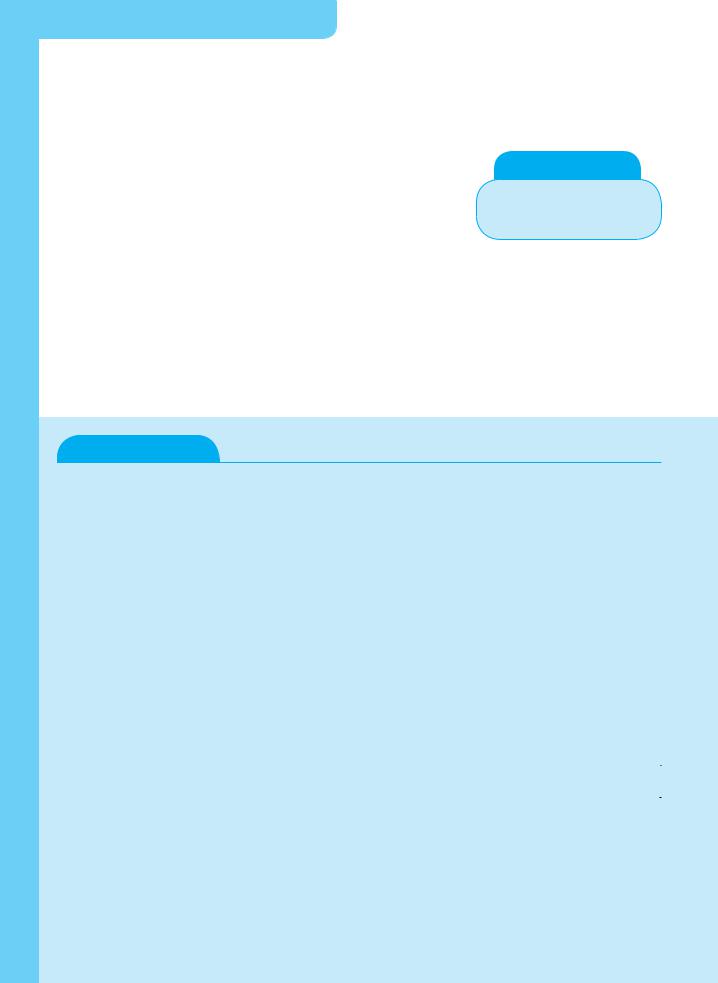
Verbs and Tenses: there is and there are
there is and there are
Use there with is and are to say what exists or what you can have. Use there is with singular nouns, and there are with plural nouns.
There is a tree in our garden.
There is a girl called Farah in my class.
There is fish for dinner.
There is nothing to do when it rains. There’s a cat sitting on the bench.
There’s a boy in my class who can walk on his hands.
There are cows in the field.
There are some very big ships in the harbor today.
N o t e s
The contraction for there is is there’s.
Exercise 4
Look at the pairs of subjects and verbs below. Then write a sentence using each subject with the simple present form of the verb. Remember that you can also use the simple present tense to talk about the future.
Example: Dad goes to work on his bike.
|
subject |
verb |
||||||||||
1. |
Dad |
go |
|
|
|
|
|
|
|
|
|
|
2. |
My brother |
ride |
|
|
|
|
|
|
|
|||
3. |
The dog |
watch |
|
|
||||||||
4. |
The bus |
leave |
|
|
|
|
||||||
5. |
Tom and Sam |
buy |
|
|
|
|
|
|||||
6. |
We |
eat |
|
|
|
|
|
|
||||
7. |
Aunt Grace |
come |
|
|
|
|||||||
8. |
Our neighbor |
like |
|
|
|
|
||||||
9. |
The boys |
start |
|
|
|
|||||||
10. |
My family |
travel |
|
|
||||||||
60

Exercise 5
Complete the following sentences by writing am, is or are in the blank spaces.
1. |
|
The weather |
|
|
|
|
|
|
|
|
beautiful today. |
|||||||
2. |
|
All the children |
|
|
|
|
|
|
|
|
|
|
on the playground. |
|||||
|
|
|
|
|
|
|
|
|||||||||||
3. |
|
Boys! You |
|
|
|
|
|
|
always late for class. |
|||||||||
|
|
|
|
|
|
|||||||||||||
4. |
|
|
|
|
|
|
you on the basketball team, too? |
|||||||||||
|
|
|
|
|
|
|||||||||||||
5. |
|
Nobody in my class |
|
|
|
|
|
|
|
|
interested in football. |
|||||||
|
|
|
|
|
|
|
|
|
||||||||||
6. |
|
|
|
|
|
|
this computer more expensive than that one? |
|||||||||||
|
|
|
|
|
|
|||||||||||||
7. |
|
Sally |
|
|
|
|
|
my best friend. |
||||||||||
|
|
|
|
|
|
|||||||||||||
8. |
|
Mom and Dad |
|
|
|
|
|
|
|
|
downstairs watching television. |
|||||||
|
|
|
|
|
|
|
|
|
||||||||||
9. |
|
Paul and Henry |
|
|
|
|
|
|
|
|
|
in the computer room. |
||||||
|
|
|
|
|
|
|
|
|
||||||||||
10. |
The Eiffel Tower |
|
|
|
|
|
|
|
|
the tallest monument in Paris. |
||||||||
|
|
|
|
|
|
|
|
|||||||||||
Exercise 6
Read the following passage. Fill in there’s, there are, there isn’t or there aren’t in the blank spaces.
I like playing in our park because |
|
|
|
some great things to play on. |
|||||||
|
a big chute to slide on and a huge sandbox to play in. |
|
|
|
|||||||
also some swings. Dogs are not allowed in the park so |
|
|
|
|
no dogs to bother us. |
||||||
|
also a lot of space for us to run around. It sometimes gets hot because |
||||||||||
|
many trees to give shade, but |
|
|
|
a fountain where we can drink |
||||||
water. It’s the best place in the town for children. |
|
|
|
another place as good as |
|||||||
the park. |
|
|
|
|
|
|
|
||||
61

Exercise 7
Rewrite the following sentences using contractions. The first one has already been done to help you.
1.It is another sunny day today.
It’s another sunny day today.
2. This is my sister. She is five.
3.I am not very interested in sports.
4.She is not my best friend. You are my best friend.
5.Cats are not as noisy as dogs.
6.We are busy doing our homework.
7.She is busy cleaning the car in the garage.
8.Our teacher is not very tall.
9.My parents are not home from work yet.
10.My friend is not very good at math.
62

Verbs and Tenses: The Present Progressive Tense
The Present Progressive Tense
The present progressive tense is used to talk about things that are continuing to happen.
Make the present progressive tense by using am, is or are with a verb that ends in ing.
I am learning how to swim.
I am eating my lunch.
I am watching television.
She is reading a book.
Dad is baking a cake.
is |
+ |
listening |
My sister is listening to music. |
|
(present participle) |
are |
+ |
playing |
Uncle David is cleaning his car. |
(present participle) |
|
|
The dog is barking in the garden. |
|
We are singing our favorite song. |
|
My brother and I are playing a computer game. |
|
The teachers are showing us a film. |
|
They are bringing a television set into the classroom.
The present progressive tense is also used to talk about things that are planned for the future.
I am going to the library tomorrow.
My sister is giving me her bike when she gets her new one.
We can’t go to the movies tomorrow because my mom is working.
We are having a barbecue on Sunday.
All my friends are coming to my party next week.
We’re taking my cousin to the zoo later today.
63

Exercise 8
Fill in the blank spaces with the present progressive tense of the verbs in parentheses. Try to use contractions such as I’m, she’s and they’re where you can.
1. |
We |
|
|
|
|
|
|
|
|
|
(go) to the zoo tomorrow. |
||||||||
2. |
He |
|
|
|
|
|
|
|
|
|
(fix) my bike in the garage. |
||||||||
3. |
I |
|
|
|
|
|
|
|
(help) Mom in the kitchen. |
||||||||||
4. |
My sister and I |
|
|
|
|
|
|
|
|
|
(watch) television in our bedroom. |
||||||||
5. |
The train |
|
|
|
|
|
|
|
|
(leave) in ten minutes. |
|||||||||
6. |
They |
|
|
|
|
|
|
|
(come) with us to the museum. |
||||||||||
7. |
We |
|
|
|
|
|
|
(paint) some pictures for Aunt Susan. |
|||||||||||
8. |
The boys and girls |
|
|
|
|
|
|
|
|
|
(dance) in the hall. |
||||||||
9. |
The cat |
|
|
|
|
|
|
(chase) some birds. |
|||||||||||
10. |
My brother |
|
|
|
|
|
|
|
(tickle) me. |
||||||||||
|
|
|
|
|
|
|
|||||||||||||
Exercise 9
Complete the following sentences with either 1) the simple present form of the verb, or 2) the present progressive form of the verb.
1. |
The teacher always |
|
|
|
|
|
|
|
|
|
(give) us interesting project work. |
|||||||||
2. |
The wind |
|
|
|
|
|
|
|
|
|
(blow) very strongly today. |
|||||||||
3. |
I |
|
|
|
|
|
|
|
(like) chocolate ice cream. |
|||||||||||
4. |
Be quiet! We |
|
|
|
|
|
|
|
|
(try) to listen to the radio. |
||||||||||
5. |
Let’s go inside now. It |
|
|
|
|
|
|
|
|
|
(begin) to rain. |
|||||||||
6. |
Penguins |
|
|
|
|
|
|
(eat) fish. |
||||||||||||
7. |
Dad never |
|
|
|
|
|
|
(let) us play in the street when it’s dark. |
||||||||||||
8. |
The children |
|
|
|
|
|
|
|
(go) swimming every day. |
|||||||||||
9. |
We’re trying to catch the ball that |
|
|
|
|
|
|
|
|
(roll) down the hill. |
||||||||||
10. |
My teacher |
|
|
|
|
|
(know) a lot about plants and animals. |
|||||||||||||
64
64

Verbs and Tenses: The Simple Past Tense
The Simple Past Tense
Use the simple past tense to talk about things that happened in the past. The simple past tense is usually made by adding ed to the verb.
I opened the door and looked inside.
The plane landed ten minutes ago.
My cousin visited us last summer.
We walked to school yesterday.
She laughed when I told her the joke.
If a verb ends in e, just add d to make the simple past tense.
Who closed all the windows?
We lived in that house when I was a baby.
She smiled when she saw me.
We raced each other on our bikes.
If a verb ends in y, change the y to i before adding ed.
I carried my mom’s shopping bag.
My brother cried when he fell off his bike.
We hurried to the station to catch the train.
Dad tried to help me with my homework.
With some short verbs that end in a consonant, you must double the consonant before adding ed.
I climbed over the fence and ripped my shirt. The stranger grabbed my arm.
The dog wagged its tail when it saw the biscuits. He slammed the door and walked off angrily.
65
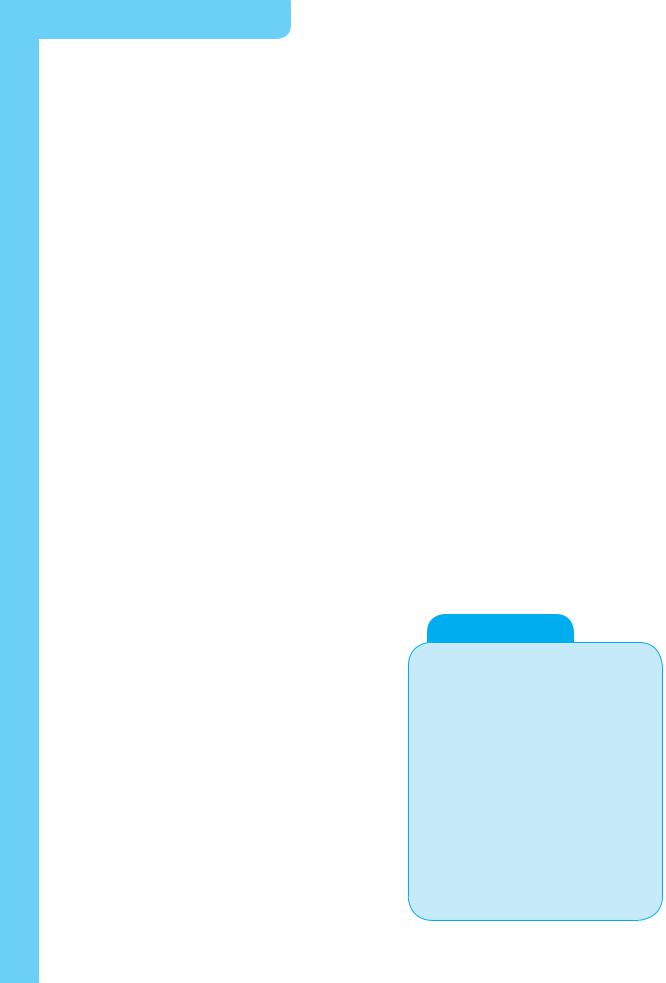
Verbs and Tenses: was and were
was and were
The words was and were are the simple past forms of the verb be.
nWas is the simple past form of am and is. Use was with singular nouns like ‘my dad’ and ‘the teacher’, and with the pronouns he, she and it.
nWere is the simple past form of are. Use were with plural nouns like ‘my parents’ and ‘Jenny and Mary’, and with the pronouns we, you and they.
Ten years ago, I was only a baby. |
|
When I was younger, I played with teddy bears. |
|
My friend was ill yesterday. |
|
Mom was angry when she saw the broken vase. |
|
It was very wet on Monday. |
|
It was six o’clock when we got home. |
|
We were away on vacation last month. |
|
John and I were in the garden. |
|
You were nasty to me! |
|
You and Sally were not at school yesterday. |
|
Dinosaurs were prehistoric animals. |
|
Those were my best jeans. |
N o t e s |
|
Here is a table to help you remember how to use was and were.
|
singular |
plural |
|
|
|
|
|
first person |
I was |
we were |
|
second person |
you were |
you were |
|
third person |
he was |
they were |
|
|
she was |
they were |
|
|
it was |
they were |
|
You may use these contractions when you are combining was and were with not.
full form |
short form |
I was not |
I wasn’t |
he was not |
he wasn’t |
she was not |
she wasn’t |
it was not |
it wasn’t |
we were not |
we weren’t |
you were not |
you weren’t |
they were not |
they weren’t |
66

Verbs and Tenses: Irregular Verbs
Irregular Verbs
Many common verbs have unusual present and past tense forms. These are called irregular verbs.
Remember that the simple past tense of most verbs is made by adding ed at the end: look becomes looked. Notice that the simple past tense of these common irregular verbs is quite different.
|
|
|
|
|
irregular verb |
simple past tense |
|
irregular verb |
simple past tense |
|
|
|
|
|
|
|
|
|
|
break |
broke |
keep |
kept |
|
bring |
brought |
kneel |
knelt |
|
buy |
bought |
know |
knew |
|
catch |
caught |
leave |
left |
|
come |
came |
lose |
lost |
|
do |
did |
meet |
met |
|
fall |
fell |
ring |
rang |
|
feed |
fed |
run |
ran |
|
feel |
felt |
see |
saw |
|
fly |
flew |
sell |
sold |
|
get |
got |
sleep |
slept |
|
go |
went |
speak |
spoke |
|
have |
had |
write |
wrote |
|
|
|
The simple past tense of other irregular verbs does not change at all. |
||
|
||||
|
|
|
|
|
|
|
verb |
simple past tense |
example |
|
|
|
|
|
|
|
cost |
cost |
I bought a new CD. It cost twenty dollars. |
|
|
cut |
cut |
My brother cut his finger this morning. |
|
|
hit |
hit |
She hit the ball into a neighbor’s garden. |
|
|
hurt |
hurt |
I hurt my leg when I jumped off the wall. |
|
|
let |
let |
Mom opened the door and let us in. |
|
|
put |
put |
The tea tasted horrible because I put too much |
|
|
|
|
sugar in it. |
|
|
read |
read |
Dad read us a story last night. |
|
|
|
|
|
67

Exercise 10
Write each past tense verb below under the correct heading.
laughed |
|
lived |
|
|
smiled |
|
landed |
cried |
|
pinned |
hurried |
|
played |
||
hopped |
|
tried |
|
|
grabbed |
|
raced |
verb + ed |
|
verb + d |
|
double the last letter + ed |
|
change y to i and add ed |
|
|
|
|
|||||
|
|
|
|
|
|
|
|
Exercise 11
Complete the sentences with the simple past tense of the verbs in parentheses.
1. |
The boys |
|
|
|
|
|
|
|
|
|
|
(whisper) secrets to each other. |
|||||||||
2. |
Uncle Ben |
|
|
|
|
|
|
|
|
(hurry) to catch his bus. |
|||||||||||
|
|
|
|
|
|
|
|
||||||||||||||
3. |
We |
|
|
|
|
|
|
|
|
(return) our books to the library. |
|||||||||||
|
|
|
|
|
|
|
|||||||||||||||
4. |
She |
|
|
|
|
|
|
|
(kiss) the frog and it |
|
(change) into a prince. |
||||||||||
|
|
|
|
|
|
|
|
||||||||||||||
5. |
Someone |
|
|
|
|
|
|
|
(tap) me on the shoulder. |
||||||||||||
|
|
|
|
|
|
||||||||||||||||
6. |
The baby |
|
|
|
|
|
|
|
(cry) when we took her toy away. |
||||||||||||
|
|
|
|
|
|
||||||||||||||||
7. |
John |
|
|
|
|
|
(pin) the badge onto his jacket. |
||||||||||||||
|
|
|
|
|
|||||||||||||||||
8. |
Two doctors |
|
|
|
|
|
|
|
|
(rush) into the room. |
|||||||||||
|
|
|
|
|
|
|
|
||||||||||||||
9. |
This is the house that we |
|
|
(live) in when I was younger. |
|||||||||||||||||
|
|||||||||||||||||||||
10. |
Grandad |
|
|
|
|
|
|
(lower) himself into the chair. |
|||||||||||||
|
|
|
|
|
|
||||||||||||||||
68

Exercise 12
Write was or were in the blank spaces in the following passage.
It |
|
|
|
|
|
a beautiful summer’s day and there |
|
|
|
n’t a cloud in the sky. |
||||||||
Mom, Dad and I |
|
|
|
|
all in the garden. Dad |
|
|
|
in the vegetable |
|||||||||
garden planting some seeds and Mom and I |
|
|
|
|
busy with other jobs. The |
|||||||||||||
sun |
|
|
|
|
hot and soon I |
|
|
feeling very tired. Mom and Dad |
||||||||||
|
|
|
|
n’t tired at all. They went on working for a long time. I |
|
|
||||||||||||
glad when it |
|
|
|
time to go inside and have a drink. |
||||||||||||||
Exercise 13
Draw a circle around the correct past tense verb in each sentence below.
1.I (losed / lost) my watch in the park.
2.David (hurt / hurted) his knee when he (falled / fell).
3.I kicked the ball hard and it (breaked / broke) a window.
4.My new shoes (cost / costed) a lot of money.
5.I (getted / got) this book from the library.
6.We had a garage where we (keeped / kept) our car.
7.Ali (shew / showed) me the cut on his knee.
8.The glass (falled / fell) off the table and (breaked / broke).
9.We (selled / sold) our old car and (buyed / bought) a new one.
10.The bell (ringed / rang) and we all (goed / went) into school.
11.The dog (catched / caught) the ball in its mouth.
12.The man (kneeled / knelt) down to talk to the little boy.
13.I (meeted / met) my friend in the park.
14.Our cat (runned / ran) onto the road in front of a car.
15.Jane (writed / wrote) a letter to her best friend.
69

Verbs and Tenses: The Past Progressive Tense
The Past Progressive Tense
Use the past progressive tense to talk about things that were happening in the past and had not stopped happening. They were continuing.
To make the past progressive tense, use was or were and a verb that ends in ing.
I was watching television.
Ben was finishing his homework.
She was putting her books into her schoolbag. Jenny and I were tidying the classroom.
We were all dancing at the party. You weren’t listening to the teacher.
Some boys were looking out of the window.
N o t e s
The ing form of a verb is called the present participle. You use the present participles with was or were to make the past progressive tense:
was + cleaning
(present participle)
were + listening
(present participle)
You can also use the past progressive tense to say what was happening when something else happened.
Sam was doing his math homework when the phone rang.
Dad was cooking our dinner when I got home.
When I saw Joe, he was looking for his dog.
We were all enjoying the movie when the power went out.
What were they doing when the bell rang?
Exercise 14
Complete the sentences with the past progressive tense of the verbs in parentheses.
1. |
At the block party lots of people |
|
|
|
|
|
|
|
(dance) in the street. |
|||||||||
|
|
|
|
|
|
|
||||||||||||
2. |
I |
|
|
|
|
|
|
|
|
(sit) in my bedroom reading a book. |
||||||||
|
|
|
|
|
|
|
|
|||||||||||
3. |
Someone |
|
|
|
|
|
|
|
|
|
(make) a very loud noise in the street. |
|||||||
|
|
|
|
|
|
|
|
|
||||||||||
4. |
Why |
|
|
|
|
you all |
|
|
|
|
|
(laugh) when I came in? |
||||||
|
|
|
|
|
|
|
|
|
||||||||||
5. |
Mike and John |
|
|
|
|
|
|
|
|
(wash) their paintbrushes. |
||||||||
|
|
|
|
|
|
|
|
|||||||||||
6. |
Sally |
|
|
|
|
|
|
|
(practice) the piano. |
|||||||||
|
|
|
|
|
|
|
||||||||||||
7. |
I ran so fast that my heart |
|
|
|
|
|
|
|
(beat) really hard. |
|||||||||
|
|
|
|
|
|
|
||||||||||||
8. |
Our neighbors |
|
|
|
|
|
|
|
|
(have) a barbecue. |
||||||||
|
|
|
|
|
|
|
|
|||||||||||
70
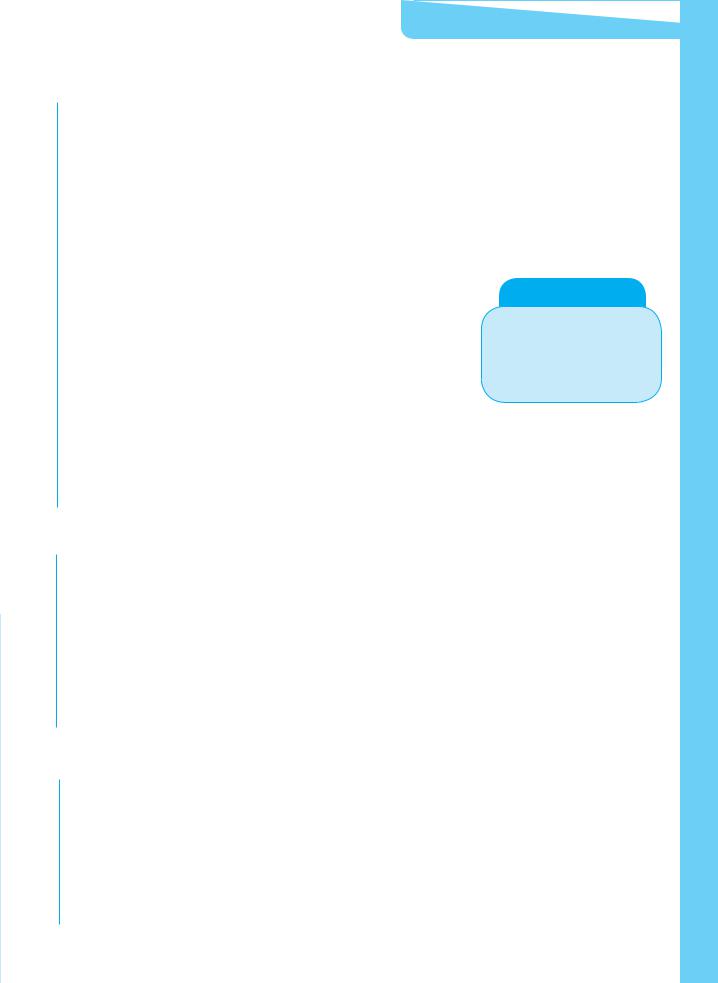
Verbs and Tenses: have, has and had
have, has and had
The verb have is used to say what people own or possess.
n Use have with the pronouns I, we, you and they, and with plural nouns such as ‘my parents’ and ‘Tom and Susan’.
nUse has with the pronouns he, she and it, and with singular nouns such as ‘my dad’ and ‘the teacher’.
I have two brothers and one sister.
Monkeys have long tails.
My sister and I have a swing in our garden. John has a big brother.
Sally has a pretty face.
An elephant has a long trunk. It also has big ears.
His brother has dark hair.
Our apartment has big windows.
N o t e s
The words have and has are the simple present forms of the verb have.
Use have to talk about things that people do or get.
I can’t play football because I have a broken leg. We have art lessons on Mondays.
You have a stain on your shirt.
They have the desks nearest the teacher. Peter has a sore knee.
You also use have to talk about things that people eat.
We usually have lunch at school.
Mom and Dad sometimes have their breakfast in bed.
Jenny often has sandwiches for lunch.
She sometimes has cola to drink.
71

Verbs and Tenses: have, has and had
Here is a table to help you remember how to use have and has.
|
|
|
|
|
singular |
plural |
|
|
|
|
|
first person |
|
|
|
I have |
we have |
||
second person |
you have |
you have |
|
third person |
he has |
they have |
|
|
she has |
they have |
|
|
it has |
they have |
|
The simple past tense form of have and has is had.
I had a big toy car when I was small.
It was sunny so we had lunch in the garden.
They had a wonderful holiday in Europe.
Sally and I had chicken for dinner.
The boys had a fight in the playground.
Dad had a sore back yesterday.
She had long hair when I saw her a year ago.
Our cat had three kittens last week.
Use had when you're talking about wishes.
I wish I had a new bike.
Kathleen wishes she had a big sister. Dad wishes he had a bigger garage.
The boys wish they had more space to play football in.
You can make the negative with didn’t have.
I wish I didn’t have so much homework. Jack wishes he didn’t have a broken leg.
Dad wishes he didn’t have to work on weekends. Do you wish you didn’t have English classes today?
72
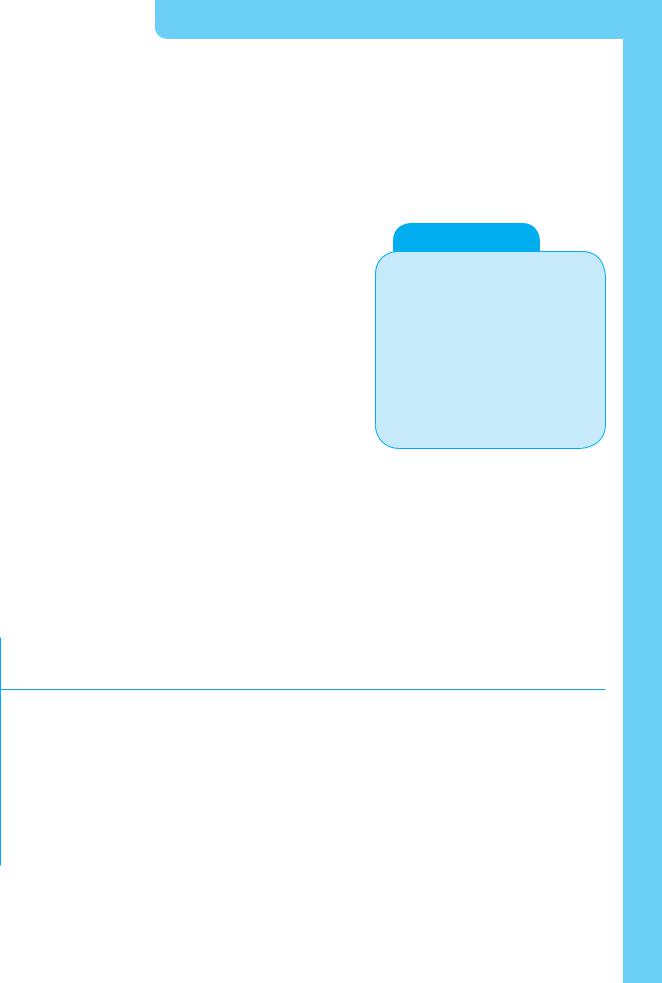
Verbs and Tenses: The Present Perfect Tense; Irregular Past Participles
The Present Perfect Tense
The present perfect tense shows action in the indefinite past. The present perfect tense is also used to show action begun in the past and continuing into the present.
To make the present perfect tense, use have or has and a verb that ends in ed.
We have lived in this house for five years. (= and we still live there)
Your plane has already landed. (= and it’s still on the ground)
She has dirtied her new shoes.
(= she made them dirty and they’re still dirty)
The teacher has pinned a notice on the board. (= and the notice is still there)
You don’t need your key. I’ve already opened the door. (= and it’s still open)
N o t e s
The ed form of a verb is called the past participle when it is used with has or have to make the present perfect tense:
have + landed
(past participle)
has + opened
(past participle)
Irregular Past Participles
Remember that irregular verbs don’t have a simple past form that ends in -ed.
Irregular verbs also have unusual past participles that don’t end in -ed. The past participle of some verbs is the same as the simple past tense.
irregular verb |
simple past tense |
past participle |
fight |
fought |
fought |
have |
had |
had |
lose |
lost |
lost |
teach |
taught |
taught |
win |
won |
won |
73

Verbs and Tenses: Irregular Past Participles
Here are more examples of irregular past participles.
irregular |
simple |
past |
example |
verb |
past tense |
participle |
|
|
|
|
|
keep |
kept |
kept |
I have kept the letter you sent me. |
catch |
caught |
caught |
The police have caught the thieves. |
bring |
brought |
brought |
Maggie has brought her favorite CD |
|
|
|
to school. |
make |
made |
made |
The children have made a birthday |
|
|
|
card for their mom. |
sell |
sold |
sold |
They’ve sold their car and now they |
buy |
bought |
bought |
have bought motorcycles. |
Some common irregular verbs have a past participle that is different from the simple past tense.
irregular |
simple |
past |
example |
verb |
past form |
participle |
|
|
|
|
|
be |
was |
been |
Anna has been my best friend for |
|
|
|
years. |
break |
broke |
broken |
I’m sorry, I’ve broken your pencil. |
do |
did |
done |
Jack has already done his homework. |
draw |
drew |
drawn |
We’ve drawn a picture for you, Mom. |
drink |
drank |
drunk |
Have you drunk all your orange juice? |
eat |
ate |
eaten |
Someone has eaten all the chocolates. |
fall |
fell |
fallen |
One of the pictures has fallen off the |
|
|
|
wall. |
go |
went |
gone |
I’m sorry, but your train has already |
|
|
|
gone. |
know |
knew |
known |
I’ve known Michael for two years. |
see |
saw |
seen |
Kathleen has already seen that movie. |
speak |
spoke |
spoken |
Miss Hill has spoken to the principal |
|
|
|
about the problem. |
74

|
|
|
|
Verbs and Tenses: Irregular Past Participles |
|
|
Some irregular verbs have a past participle that does not change at all. |
||
|
||||
|
|
|
|
|
|
|
irregular |
past |
example |
|
|
verb |
participle |
|
|
|
|
|
|
|
|
cut |
cut |
I’ve cut my finger and it’s bleeding badly. |
|
|
hit |
hit |
The children next door have hit their ball into the |
|
|
|
|
busy street. |
|
|
cost |
cost |
This vacation has cost us hundreds of dollars already. |
|
|
read |
read |
Dad hasn’t read my school report yet. |
|
|
hurt |
hurt |
Can Anna sit down? She’s hurt her leg. |
|
|
put |
put |
Have you put any sugar in my tea? |
Exercise 15
Complete the following sentences with has or have.
1. |
My dog |
|
|
|
|
|
|
|
|
|
|
a long shiny coat. |
|
||||||||||
2. |
Our teacher |
|
|
|
|
|
|
|
|
|
|
a very kind face. |
|
||||||||||
|
|
|
|
|
|
|
|
|
|
|
|||||||||||||
3. |
You |
|
|
|
|
|
|
|
|
a lot of homework to do. |
|
||||||||||||
|
|
|
|
|
|
|
|
|
|||||||||||||||
4. |
Sam and I |
|
|
|
|
|
|
|
|
|
|
desks near the front of the class. |
|||||||||||
|
|
|
|
|
|
|
|
|
|||||||||||||||
5. |
Paul |
|
|
|
|
|
|
|
two brothers and a sister. |
|
|||||||||||||
|
|
|
|
|
|
|
|
||||||||||||||||
6. |
My friend Andy |
|
|
|
|
|
|
|
|
|
|
a big house. |
|
||||||||||
|
|
|
|
|
|
|
|
|
|
|
|||||||||||||
7. |
Mice |
|
|
|
|
|
|
|
long tails. |
|
|||||||||||||
|
|
|
|
|
|
|
|
||||||||||||||||
8. |
Most dogs |
|
|
|
|
|
|
|
|
|
sharp teeth. |
|
|||||||||||
|
|
|
|
|
|
|
|
|
|
||||||||||||||
9. |
I |
|
|
|
more toys than my friend |
|
. |
||||||||||||||||
|
|
|
|
||||||||||||||||||||
10. |
These flowers |
|
|
|
|
|
|
|
|
|
|
a strange smell. |
|
||||||||||
|
|
|
|
|
|
|
|
|
|
|
|||||||||||||
75

Exercise 16
Complete the sentence with the present perfect tense of the verbs in parentheses.
1. |
The children |
|
|
|
|
|
|
|
|
|
|
(make) the house very messy. |
|||||||||
2. |
I |
|
|
|
|
|
|
|
(see) that actor in several movies. |
||||||||||||
|
|
|
|
|
|
|
|||||||||||||||
3. |
The boys |
|
|
|
|
|
|
|
|
(drink) all the soda in the refrigerator. |
|||||||||||
|
|
|
|
|
|
|
|||||||||||||||
4. |
Our dog |
|
|
|
|
|
|
|
|
(hurt) its leg. |
|||||||||||
|
|
|
|
|
|
|
|||||||||||||||
5. |
One of the workmen |
|
|
|
|
|
|
|
|
|
|
|
(fall) off his ladder. |
||||||||
|
|
|
|
|
|
|
|
|
|
||||||||||||
6. |
She’s sad because her friends |
|
|
|
|
(go) to the park without her. |
|||||||||||||||
|
|
|
|
||||||||||||||||||
7. |
Dad |
|
|
|
|
|
(have) a shower already. |
||||||||||||||
|
|
|
|
||||||||||||||||||
8. |
I’ve been shouting so much that I |
|
|
|
|
(lose) my voice. |
|||||||||||||||
|
|
|
|
||||||||||||||||||
9. |
My sister’s boyfriend |
|
|
|
|
|
|
|
|
|
|
(buy) her a diamond ring. |
|||||||||
|
|
|
|
|
|
|
|
|
|
||||||||||||
10. |
Alan |
|
|
|
(do) this jigsaw puzzle so many times that he could do it with |
||||||||||||||||
|
|
|
|||||||||||||||||||
|
his eyes shut. |
|
|
|
|
|
|
|
|
|
|
|
|
||||||||
Exercise 17
Draw a circle around the correct past participle in each sentence below.
1.Your child has (broke/broken) my window!
2.Have you (eaten/ate) all your dinner?
3.I have (known/knew) Sally since we were in kindergarden.
4.Michael has (drew/drawn) a picture for his grandad.
5.The new girl seems nice, but I haven’t (spoke/spoken) to her yet.
6.We’ve (drank/drunk) all the milk.
7.The ball has (went/gone) over the garden fence.
8.Has Tom (did/done) all his homework?
9.You have (been/was) late for school every day this week.
10.Help! I’ve (fell/fallen) down a hole!
76
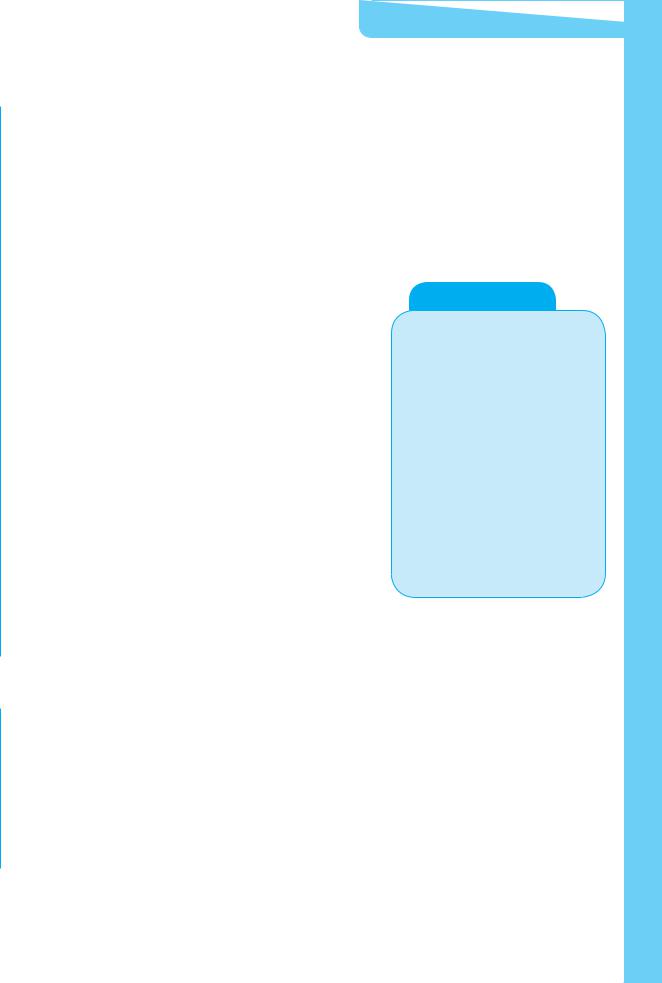
Verbs and Tenses: The Future Tense
The Future Tense
To show future action use the verbs shall and will with another verb that describes the action.
n You can use either shall or will with the pronouns I and we. n Use will with the pronouns you, he, she, it and they.
n Will is also used with singular nouns like ‘my dad’ and with plural nouns like ‘all the boys in my class’.
I shall do my homework after dinner. |
N o t e s |
|
I will miss you when you leave. |
||
|
||
We shall take the dog for a walk later. |
You can shorten shall and |
|
We will visit Grandma this weekend. |
will as ’ll when you use these |
|
words with pronouns: |
He will be home later. |
|
|
|
|
|
|
|
full form |
contraction |
||
She will help us cook the food for the party. |
|
||||
|
|
|
|||
|
I shall, I will |
I’ll |
|||
It will soon be dark outside. |
|||||
we shall, we will |
we’ll |
||||
|
|
|
|||
I think it will be sunny tomorrow. |
you will |
you’ll |
|||
I expect they will give you a present. |
he will |
he’ll |
|||
Mom will be very pleased with you. |
she will |
she’ll |
|||
it will |
it’ll |
||||
|
|
|
|||
Your plant will die without water. |
they will |
they’ll |
|||
The school will soon need a lot of repairs. |
|
|
|||
John and I shall be glad when the exams are over. |
|
|
|||
Bill and Kim will be late for school if they don’t hurry.
To make the negative form, use will and shall with not. The contraction for will not is won’t.
I will not help you unless you help me first.
It won’t be very sunny again until next summer.
You won’t like this food. It’s horrible!
We shall not go to the party without you.
77

Verbs and Tenses: The Future Tense
To talk about facts in the future or plans that will not change, use the simple present tense.
Tomorrow is Sunday.
Summer vacation ends on Friday.
The new library opens next week.
We fly to Paris on Wednesday.
You can also talk about plans for the future and other future happenings by using be going to and another verb. Remember to:
n Use am and was with the pronoun I.
n Use is and was with the pronouns he, she and it, and with singular nouns like ‘my mom’ and ‘the teacher’.
n Use are and were with the pronouns we, you and they, and with plural nouns like ‘my friends’ and ‘John and Sally’.
I am going to visit my cousin tomorrow.
I am going to see the new Star Wars movie next week.
My friend John is going to move to Chicago next year.
Dad is going to buy me a skateboard.
Aunt Jane is going to have another baby soon.
It is going to be windy tomorrow.
I hope someone is going to fix the television soon.
You are going to help me, aren’t you?
My friends are going to teach me how to play chess.
Mom and Dad are going to buy a new computer.
Your books are going to fall off the shelf if you’re not careful.
Are you going to read your book now?
78

Exercise 18
Decide whether shall and will are used correctly in each sentence. Put a checkmarkin the box for a correct use and an x in the box for an incorrect use.
1.My dad will 
 be home later.
be home later.
2.I will 
 never forget my days at school.
never forget my days at school.
3.Tom and Kumar shall 
 come with us.
come with us.
4.The weather report says that it shall 
 be sunny again tomorrow.
be sunny again tomorrow.
5.We will 
 miss my cousins when they leave.
miss my cousins when they leave.
6.Raj and I shall 
 feel happier when the exams are over.
feel happier when the exams are over.
7.It will 
 be late when we arrive in London.
be late when we arrive in London.
8.I shall 
 stay awake all night and watch for Santa Claus.
stay awake all night and watch for Santa Claus.
9.My grandparents shall 
 enjoy coming to our house for Christmas.
enjoy coming to our house for Christmas.
10.The winter holidays shall 
 give us all a good rest.
give us all a good rest.
Exercise 19
Read the pairs of subjects and verbs below. Then write sentences about future events using the correct form of be going to. For example, for the first sentence you could write:
My friend Tom is going to sleep at my house tonight.
|
subject |
verb |
1. |
My friend Tom |
sleep |
2. |
We |
ride |
3. |
The dog |
catch |
4. |
Uncle Andy |
come |
5. |
It |
rain |
6. |
We |
eat |
7. |
Jamal and I |
have |
8. |
The teachers |
read |
79

Verbs and Tenses: do, does and did
do, does and did
The verb do is used to talk about actions. The words do and does are the simple present forms of the verb do.
n Use do with the pronouns I, we, you and they, and with plural nouns such as ‘my parents’ and ‘Tom and Susan’.
n Use does with the pronouns he, she and it, and with singular nouns such as ‘my dad’ and ‘the teacher’.
I always do my homework after dinner.
I do drawings with colored pencils.
We do our shopping at the supermarket.
You do magic tricks very well.
They do their housework on the weekend.
Mom and Dad do the cooking together.
Jim and Alan always do well in math tests.
The artist does beautiful paintings.
She does very interesting work.
He does the washing and she does the cooking.
Julie always does her exercises before breakfast.
My friend Hannah does karate at a local gym.
The vacuum cleaner does a better job than the broom.
Here is a table to help you remember how to use do and does.
|
singular |
plural |
|
first person |
|
|
|
I do |
we do |
||
second person |
you do |
you do |
|
third person |
he does |
they do |
|
|
she does |
they do |
|
|
it does |
they do |
|
80

Verbs and Tenses: do, does and did
The simple past form of do is did.
I did my homework but forgot to take it to school.
Sally did her hair in front of the mirror.
The boys did very badly in their spelling test.
Paul and Roger did some magic tricks for us.
The children did the housework while their parents relaxed.
To make the negative form of verbs in the simple present tense, use do and does with not.
I do not have any brothers or sisters.
We do not want any more bread, thank you.
My brother and I do not like football.
You see beautiful mountains in Scotland but you do not see much sunshine. Mom does not buy our food at that supermarket.
Jenny does not eat lunch at school because she does not like the food.
My cat does not make as much noise as your dog.
The simple past tense of does not and do not is did not. The contraction is didn’t.
Maggie did not have long hair when I first met her.
I got sunburned because I did not wear my hat.
The teacher didn’t give us any homework.
Mom and Dad didn’t buy me a cell phone for my birthday.
You didn’t take the dog for a walk last night.
N o t e s
Here are the contractions you can use when do, does and did are used with not.
|
|
|
full form |
short form |
|
I/we do not |
I/we don’t |
|
|
||
you do not |
you don’t |
|
they do not |
they don’t |
|
he/she/it does not |
he/she/it doesn’t |
|
full form |
short form |
I/we did not |
I/we didn’t |
you did not |
you didn’t |
they did not |
they didn’t |
he/she/it did not |
he/she/it didn’t |
81

Exercise 20
Complete the following sentences with do, does or did.
1. |
I always |
|
|
|
|
|
|
|
|
|
my homework in my room. |
|||||||||||
2. |
Mom and Dad usually |
|
|
|
|
|
|
|
the laundry together. |
|||||||||||||
3. |
You |
|
|
|
|
|
|
|
the same math problems last week. |
|||||||||||||
4. |
We always |
|
|
|
|
|
|
|
|
|
our shopping at the farmers' market. |
|||||||||||
5. |
The children |
|
|
|
|
|
|
|
|
|
their work quietly while the teacher looks at their |
|||||||||||
|
homework. |
|
|
|
|
|
|
|
|
|
|
|
|
|
||||||||
6. |
Uncle David |
|
|
|
|
|
|
|
|
magic tricks when he comes to visit. |
||||||||||||
7. |
Last night, Mom |
|
|
|
|
|
|
|
|
her exercises before bedtime. |
||||||||||||
8. |
Anna played the piano and Rachel |
|
|
a lively dance. |
||||||||||||||||||
9. |
Kamal always |
|
|
|
|
|
|
|
well in math tests. |
|
|
|||||||||||
10. |
If John |
|
|
|
the cooking, will you |
|
|
the dishes? |
||||||||||||||
Exercise 21
Complete the following sentences with the contractions don’t, doesn’t or didn’t.
1. |
|
Katy |
|
|
|
|
|
|
go to school on the bus. |
|||||
2. |
|
I |
|
|
|
|
|
like chocolate ice cream. |
||||||
3. |
|
If the weather |
|
|
|
|
|
|
|
improve, we’ll have the party indoors. |
||||
4. |
|
|
|
|
|
|
|
worry about the mess. It does not matter. |
||||||
5. |
|
I |
|
|
|
|
answer all the questions on the math test. |
|||||||
6. |
|
Mom and Dad |
|
|
|
|
|
|
|
work on weekends. |
||||
7. |
|
My sister and I |
|
|
|
|
|
|
|
visit Grandma last Sunday. |
||||
8. |
|
My friend John |
|
|
|
|
|
|
|
finish his homework yesterday. |
||||
9. |
Our neighbors |
|
|
|
|
|
|
|
like dogs very much. |
|||||
10. |
|
Our teacher |
|
|
|
|
|
speak Japanese. |
||||||
82

Verbs and Tenses: The Infinitive
The Infinitive
The infinitive is the base form of a verb. It is often preceded by the word to.
Infinitives often appear after other verbs.
The rain began to fall.
Sally and I agreed to meet this afternoon.
I’ve arranged to see the doctor at 3 o’clock.
I hope to visit Disneyland someday.
I like to ride my bike in the street.
My parents have decided to buy a new car.
Paul is learning to swim.
I didn’t mean to upset you.
Some verbs have an object before the infinitive. In these examples the objects are printed in color.
Simon asked me to help him.
The teacher told us not to run in the corridor.
Susie persuaded her friends to play on the team.
The manager allowed the staff to leave early.
Infinitives often appear after adjectives. In these examples the adjectives are printed in color.
The boys were afraid to cross the busy road.
I’m very pleased to see you again.
This problem will be difficult to solve.
The shelf is too high to reach.
Don’t you think it’s rude to ignore the new girl in class?
The experiment was interesting to watch.
You’re welcome to come with me.
83
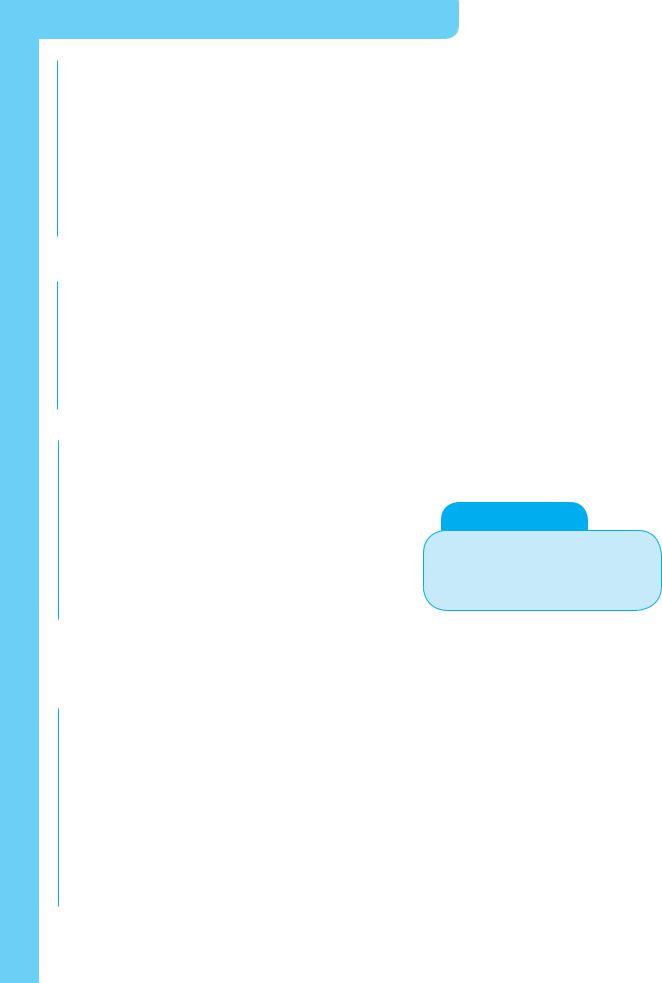
Verbs and Tenses: The Infinitive; The Imperative Form of Verbs
You can also use infinitives after some nouns and pronouns to say what you are using something for.
Take a book to read.
I phoned for a taxi to take us to the airport.
Has everyone got something to drink?
I’ve got lots of nice clothes to wear.
Find a space on the floor to sit in.
Infinitives sometimes follow words like how, what, which and where.
My brother is learning how to cook.
I can’t decide which to choose—the ice cream or the pudding. I don’t know what to say.
Sally can’t remember where to hang her coat.
Infinitives are also used after helping verbs such as will, can, should, may and must. After these helping verbs use infinitives without the word to.
I can swim.
We think she will win the race. You must try harder.
Do you think we should wait?
N o t e s
The helping verbs will, can, should, may and must are called auxiliary verbs.
May I come in?
The Imperative Form of Verbs
When you give an order or command, use the base form of a verb, such as give, read or come. This base form is called the imperative.
Open your books to page 25.
Stop and look before you cross the road.
Come to the front of the class.
Show me your homework.
Read the first sentence out loud.
Choose a partner and stand in a circle.
84
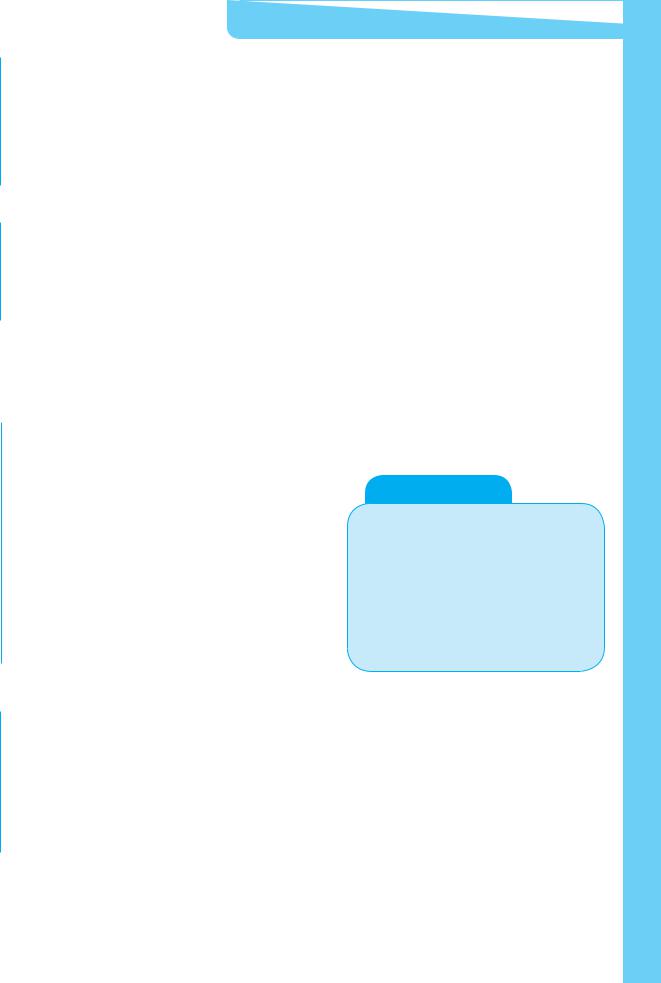
Verbs and Tenses: The Imperative Form of Verbs; Gerunds
Imperatives are very direct. To be more polite, you can use please before the imperative.
Please show me your homework.
Please read the first sentence out loud.
Please come to the front of the class.
To make negative imperatives, use do not or don’t before the base form of the verb.
Do not bring calculators into the exam room.
Please don’t change anything on my computer.
Gerunds
A gerund is the ing form of a verb used as a noun. Sometimes a gerund is called a verbal noun because it comes from a verb.
Running is a good way to keep fit. Susan is very good at drawing. He loves dancing and singing. Have you ever tried sailing?
I don’t like watching television.
We enjoyed visiting our grandparents.
N o t e s
Sometimes it is difficult to know whether an ing word is a gerund or a present participle. If you can replace the ing word or its phrase with the pronoun it, then the word is a gerund. Look again at the examples on the left. Try replacing the words in bold with it.
Some gerunds can be used in front of other nouns, like adjectives.
a washing machine |
= a machine that does washing |
|
a shopping bag |
= a bag for carrying your purchases |
|
walking boots |
= |
boots you wear for walking in the countryside |
gardening clothes |
= |
clothes you wear for gardening |
85
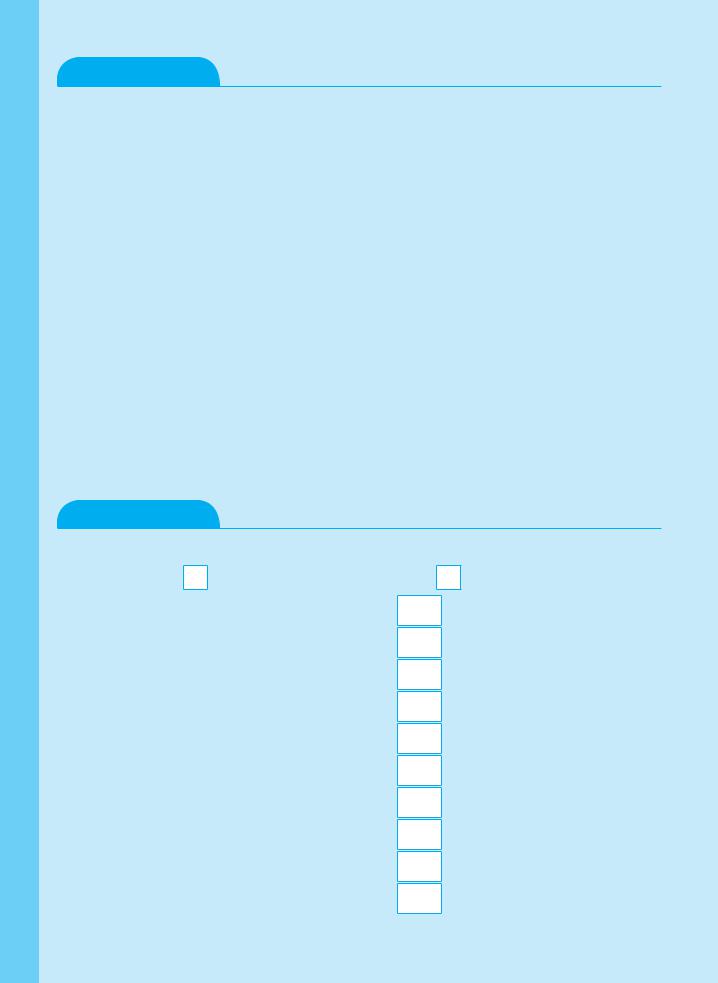
Exercise 22
Look at the following half-sentences that contain adjectives. Complete each sentence with an infinitive. For example, for the first sentence you could write:
|
I was too afraid to touch the spider. |
|
|||||||||||
1. |
I was too afraid |
|
|
|
|
|
|
|
|
|
|
|
. |
2. |
Mom and Dad are happy |
|
|
|
|
|
|
. |
|||||
3. |
She seemed very pleased |
|
|
|
|
|
|
. |
|||||
4. |
The book was very interesting |
|
|
|
. |
||||||||
5. |
Is your hand small enough |
|
|
|
|
? |
|||||||
6. |
The dog looked too tired |
|
|
|
. |
||||||||
7. |
The wall was impossible |
|
|
|
. |
||||||||
8. |
The first question wasn’t easy |
|
|
. |
|||||||||
9. |
It was embarrassing |
|
|
. |
|||||||||
10. |
The sea was warm and wonderful |
|
. |
||||||||||
Exercise 23
Decide whether or not each sentence uses the infinitive correctly. Mark a correct use with a checkmark ¸ and an incorrect use with an x .
1. She likes play in the park.
2. The sun was beginning to shine.
3. I decided to help Dad with the dinner.
4. Mom asked me close the window.
5. The teacher warned me to be quiet.
6. I didn’t know which tool use.
7. We couldn’t decide how many cakes to buy.
8. Can I to watch the TV, Mom?
9. Do you think I should help him?
10. I think I shall to go home now.
86

Exercise 24
Study the following pairs of verbs and nouns. Then write a sentence using each pair with the verb as an imperative. Try to use negatives in some of your sentences. For the first pair, you could write:
|
Show him the picture. or |
Don’t show him the picture. |
||
|
verb |
noun |
|
|
1. |
show |
picture |
|
|
2. |
bring |
bike |
|
|
3. |
eat |
sandwiches |
|
|
4. |
wash |
hands |
|
|
5. |
listen |
parents |
|
|
6. |
wait |
name |
|
|
7. |
sleep |
classroom |
|
|
8. |
make |
noise |
|
|
Exercise 25
Make a gerund from each verb below. Then write a sentence using that gerund. For example, the gerund you can make from the first verb is cycling. You could write the sentence:
She loves cycling in the countryside.
verb |
gerund |
1. cycle |
cycling |
2.paint
3.eat
4.sleep
5.watch
6.bake
7.fly
8.cook
87
